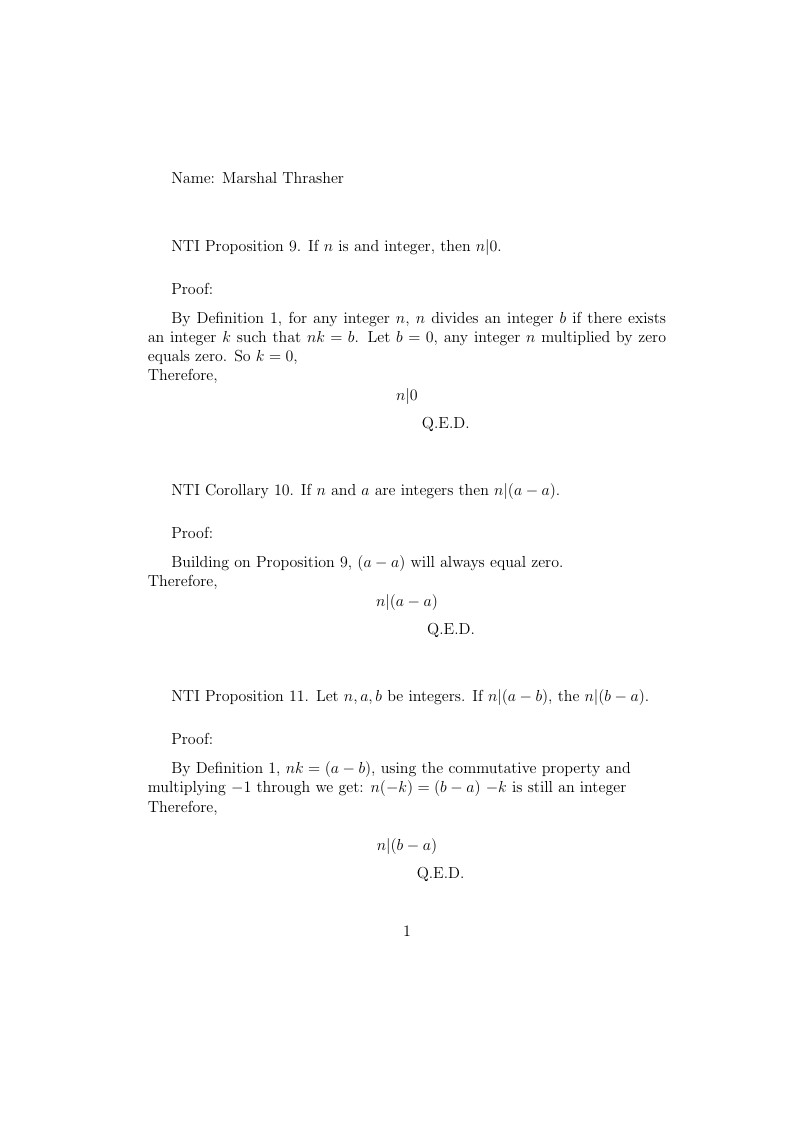
NTI 9-12
Autor:
Marshal
Last Updated:
hace 10 años
License:
Creative Commons CC BY 4.0
Resumen:
HW4

\begin
Discover why over 25 million people worldwide trust Overleaf with their work.

\begin
Discover why over 25 million people worldwide trust Overleaf with their work.
\documentclass[12pt]{article}
\def\Z{\mathbb Z}
\def\N{\mathbb N}
\def\Q{\mathbb Q}
\def\R{\mathbb R}
\def\C{\mathbb C}
\begin{document}
Name: Marshal Thrasher
\vspace{.5in}
NTI Proposition 9. If $n$ is and integer, then $n|0$.
\vspace{.25in}
Proof:
\vspace{.1in}By Definition 1, for any integer $n$, $n$ divides an integer $b$ if there exists an integer $k$ such that $nk=b$.
Let $b=0$, any integer $n$ multiplied by zero equals zero. So $k=0$,
\\ Therefore,
$$n|0$$
\hspace{2.8in} Q.E.D.
\vspace{.5in}
NTI Corollary 10. If $n$ and $a$ are integers then $n|(a-a)$.
\vspace{.25in}
Proof:
\vspace{.1in}
Building on Proposition 9, $(a-a)$ will always equal zero. \\
Therefore,
$$n|(a-a)$$
\vspace{.5in}
\hspace{2.8in} Q.E.D.
NTI Proposition 11. Let $n,a,b$ be integers. If $n|(a-b)$, the $n|(b-a)$.
\vspace{.25in}Proof: \vspace{.1in}
By Definition 1, $nk=(a-b)$, using the commutative property and \\multiplying $-1$ through we get:
$n(-k)=(b-a)$
$-k$ is still an integer \\
Therefore,
$$n|(b-a)$$
\hspace{2.8in}Q.E.D.
NTI Proposition 12. Let $n,a,b,c$ be integers. If $n|(a-b)$ and $n|(b-c)$, then $n|(a-c)$.
\vspace{.25in}
Proof:
\vspace{.1in}
By Definition 1, $nk_{1}=(a-b)$ and $nk_{2}=(b-c)$ such that $k_{1}$ and $k_{2}$ are integers. By adding $c$ to both sides on the second equation we obtain:
$$c+nk_{2}=b$$
We can now substitute $b$ out of the first equation:
$$nk_{1}=a-c+nk_{2}$$
After tidying up the equation we get: $$n(k_{1}-k_{2})=a-c$$
Through the basic properties we know the Left Hand Side will always be and integer. \\
Therefore,
$$n|(a-c)$$
\hspace{2.8in} Q.E.D.
\end{document}